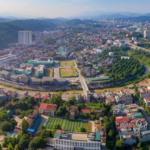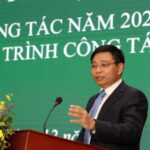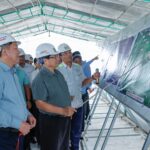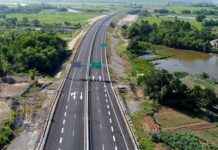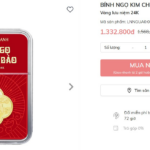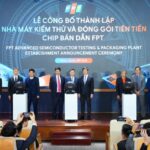This was emphasized by Prime Minister Pham Minh Chinh at the Conference with Ambassadors and Heads of Vietnamese Representative Agencies Abroad, summarizing economic diplomacy in 2024 and deploying key tasks for 2025, on the evening of December 20.
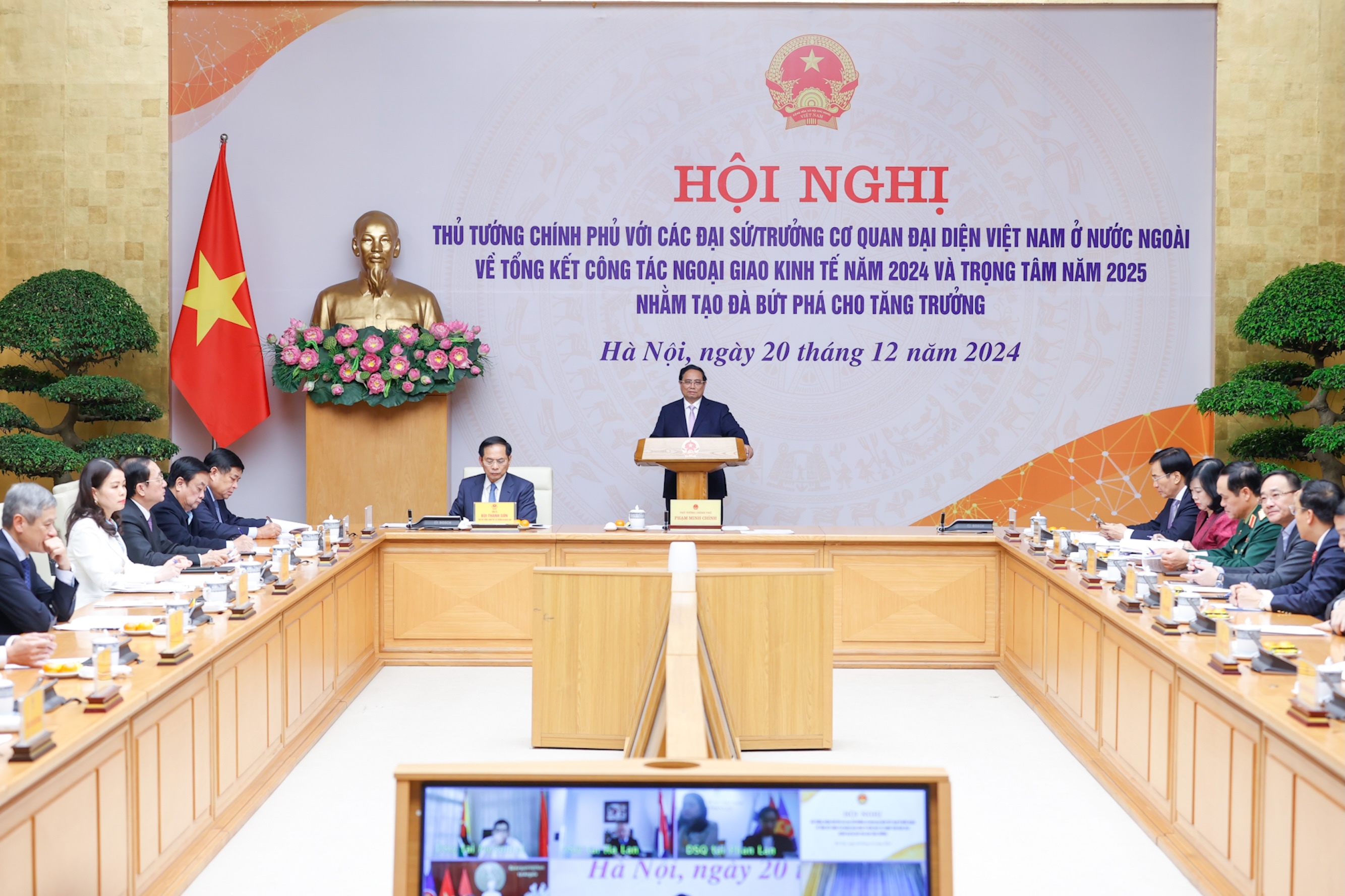
Conference Overview. Photo: VGP
|
According to the Prime Minister, economic diplomacy has truly become a crucial aspect of all foreign affairs activities, especially high-level diplomacy. There has been a positive shift in thinking and approach, leading to more proactive, substantial, and effective actions. It has also contributed efficiently to implementing strategic breakthroughs, with economic diplomacy being institutionalized and systematically organized, gaining consensus and involvement from the entire political system, along with close coordination between ministries, sectors, and localities.
The Prime Minister affirmed that economic diplomacy is becoming more substantial and well-organized, with three clear aspects: clear results, clear products, and clear contributions to the country’s socio-economic development.
Some specific and quantifiable outcomes include attracting chip manufacturing giants like NVIDIA to Vietnam, expanding export markets for agricultural products, achieving record-high agricultural export turnover, significantly developing tourism, and boosting the aviation industry. As a result, there has been an increase in trust from partners, and the momentum from high-level visits has been effectively utilized by ministries, sectors, and businesses. New markets such as the Middle East, Halal market, and South America have also been tapped.
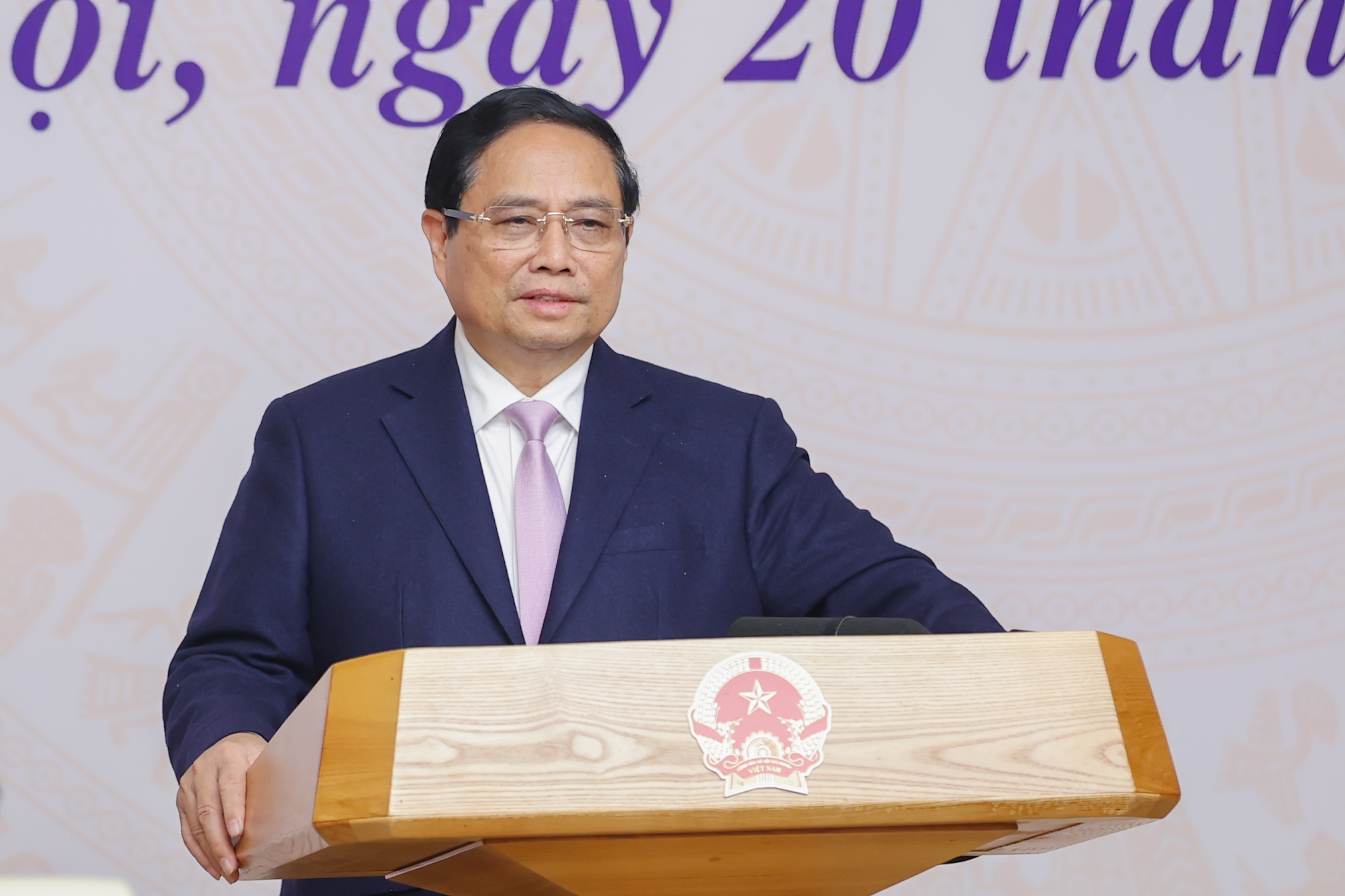 Prime Minister Pham Minh Chinh delivering the concluding remarks at the Conference. Photo: VGP
|
Looking ahead, the Prime Minister stated that the international situation will become increasingly complex, with opportunities and challenges intertwining, and challenges remaining prominent. Therefore, high determination, great efforts, and resolute actions are necessary, focusing on creating breakthroughs in economic diplomacy.
The year 2025 is crucial for accelerating and completing the development goals set for the 2021-2025 period. It also involves actively reorganizing agencies and preparing for significant national anniversaries, as well as thoroughly preparing for the Party Congresses at all levels, leading up to the fourteenth National Party Congress, which will usher in a new era of national advancement.
To achieve the goal of becoming a high-middle-income country by 2030 and a high-income country by 2045, Vietnam’s economic growth rate must reach 8% in 2025 and double digits in the following years.
The Prime Minister instructed that economic diplomacy should contribute more to realizing these goals. Ministries, sectors, localities, and agencies must all exert greater efforts, demonstrating even higher determination, putting in more effort, and taking more resolute actions. “Once the Party has directed, the Government has agreed, the National Assembly has consented, the people have supported, and the country has expected, we should only discuss how to do it, not whether to do it,” he emphasized.
Moving forward, economic diplomacy should focus on promoting the signing of legal frameworks such as FTAs, IPAs, and CEPAs. It is also essential to identify distinct potentials, outstanding opportunities, and competitive advantages for Vietnam and its partners to determine areas of cooperation, complementarity, and competition. Additionally, there should be an emphasis on connecting Vietnamese businesses with international counterparts.
Clarifying that economic diplomacy is a new and important driving force, the Prime Minister urged the renewal of traditional growth drivers, including exports, investment, and consumption. He also highlighted the need to promote new growth drivers, such as green economy, digital economy, circular economy, knowledge-based economy, sharing economy, and night-time economy. Building brands for Vietnamese products and services, conducting substantive and effective trade and investment promotions, developing sustainable competitive markets, and diversifying products, markets, and supply chains are also crucial aspects.
To achieve these goals, it is necessary to strengthen diplomacy in various fields, continuing to promote technology diplomacy, tea diplomacy, shrimp diplomacy, and more. Particular emphasis should be placed on expanding technology cooperation, especially in technology transfer for semi-conductor chips and artificial intelligence. Cooperation in space exploration, ocean space, and underground space should also be pursued. At the same time, the Prime Minister noted the importance of continuing to reform visa policies to attract more investment and tourism.
The Prime Minister assigned specific tasks to the Ambassadors and Heads of Vietnamese Representative Agencies Abroad. These include urging the United States to remove Vietnam from the group of countries with export restrictions on technology and soon recognize Vietnam as a market economy. Other tasks involve promoting cooperation with China in developing border gate economics and connecting transportation, especially rail links, and collaborating with Middle Eastern countries to establish an International Financial Center in Ho Chi Minh City and remove the “yellow card” for seafood exports issued by the EC.
“Incentivizing Investment in Sustainable Smart Industrial Parks: A Policy Mechanism for Vietnam’s Future”
A myriad of experts advocate for a policy mechanism that incentivizes investment in, and the development of, new-generation smart and sustainable industrial zones. This includes delineating specific standards and criteria for what constitutes a “green” industrial zone, as well as establishing a clear framework of incentives and support for investors and industrial zone developers who wish to embark on new projects or transition from old models to these new-generation zones.
Is the Social Housing Project Series Launch Cooling the Condo Market?
The final months of 2024 brought a wave of good news for Hanoi’s real estate market, with multiple social housing projects being inaugurated and granted construction permits. This surge in social housing supply is a welcome development, bringing the dream of home ownership within reach for low and middle-income earners.
Unlocking the Potential: Unveiling Laos Cai’s 119 Land Plots with an Enticing Starting Bid of VND 8 Million per square meter
The upcoming month will see 119 land lots go under the hammer in the final quarter of the year. With a starting bid of 973 million VND, these prime plots of land are an opportunity not to be missed. Located in the thriving wards of Binh Minh, Bac Leng, Xuan Tang, and Nam Cuong in Lao Cai city, the lots offer a unique chance for investors and homeowners alike. The auction will also feature premium land with a starting bid of over 5.3 billion VND, presenting a rare opportunity to acquire valuable real estate in a thriving city.
Unlocking Vietnam’s Transport Network: The Vision for a Seamless Highway from Cao Bang to Ca Mau by 2025
The Prime Minister has issued a directive that there must be no changes to the timeline for the North-South Expressway’s eastern section, stretching from Cao Bang – Lang Son to Ca Mau. He emphasized that the entire route must be open and operational by December 31, 2025, with no delays tolerated.



